In today’s fast-paced and unpredictable business landscape, ensuring the stability and longevity of your venture is important. As a business owner, you face several risks, ranging from natural disasters to liability claims. Safeguarding your business against such unforeseen events is crucial, and that’s where business insurance comes into play.
Introduction
Starting a business is an exciting and rewarding occupation. However, it also involves inherent risks that can threaten the success and sustainability of your enterprise. Business insurance acts as a safety net, providing financial protection and minimizing the potential impact of unexpected events. It offers coverage for a wide range of risks, ensuring that your business can bounce back from adversity and continue to thrive.
Importance of Business Insurance
Business insurance is not just an option; it’s a necessity. It serves as a vital tool for mitigating risks and protecting your assets, employees, and customers. By investing in the right insurance coverage, you can safeguard your business from potential losses and liabilities that could otherwise be financially devastating. Whether you’re a small startup or an established company, having appropriate insurance coverage is a fundamental aspect of responsible business management.
Types of Business Insurance
1. Property Insurance
Property insurance covers loss or damage from risks like fire, theft, and natural disasters to your physical assets such as buildings, machinery, inventory, and furniture. It provides financial reimbursement for repairs, replacement, or reconstruction, ensuring that your business can swiftly recover from property-related incidents.
2. Liability Insurance
Liability insurance safeguards your business against legal liabilities arising from bodily injury, property damage, or personal and advertising injury caused to third parties. It covers legal fees, settlements, and judgments, allowing you to focus on your operations without the fear of potential lawsuits derailing your progress.
3. Business Interruption Insurance
Business interruption insurance is a crucial form of coverage that protects your business income and helps you stay afloat during unexpected disruptions. It compensates for lost revenue and covers ongoing expenses, such as rent and payroll if your business operations are temporarily halted due to events like natural disasters or infrastructure failures.
4. Workers’ Compensation Insurance
Workers’ compensation insurance is mandatory in many regions and provides coverage for work-related injuries or any illnesses suffered by your employees. It covers medical expenses, rehabilitation costs, and a portion of lost wages, ensuring that your employees receive proper care while safeguarding your business from potential lawsuits.
5. Professional Liability Insurance
Professional liability insurance (errors and omissions (E&O) insurance) is essential for businesses that provide professional services. It protects against claims of negligence, errors, or omissions that may arise from the services rendered, giving you peace of mind and protecting your professional reputation.
6. Cyber Insurance
In today’s digital age, businesses are increasingly vulnerable to cyber threats and data breaches. Cyber insurance provides coverage for the financial losses and liabilities associated with cyber incidents such as hacking, data breaches, and network disruptions. It helps cover expenses related to the investigation, notification, legal fees, and even potential fines or regulatory penalties. With the rising importance of cyber security, having cyber insurance is essential to protect your business and maintain customer trust.
7. Business Owner’s Policy (BOP)
A Business Owner’s Policy, commonly known as a BOP, is a comprehensive insurance package that combines multiple coverages into a single policy. It typically includes property insurance, liability insurance, and business interruption insurance. A BOP is designed for small and medium-sized businesses and offers a cost-effective solution for obtaining essential coverage that addresses common risks faced by these businesses.
Key Considerations for Business Owners
As a business owner, it’s crucial to assess your specific needs and risks before choosing the right insurance coverage. Here are some key considerations to keep in mind:
1. Business Size and Industry
The size of your business and the industry you operate in play a significant role in determining the type and level of insurance coverage required. Consider the specific risks associated with your industry and tailor your insurance policy accordingly.
2. Business Assets
Evaluate the value of your business assets, including property, equipment, inventory, and intellectual property. This assessment will help you determine the appropriate coverage limits needed to adequately protect your assets.
3. Employee Base
Your number of employees and the nature of their work influence the insurance requirements. Ensure you comply with legal obligations, such as workers’ compensation insurance, and consider additional coverage options to protect your employees and your business.
4. Potential Risks
Identify the potential risks and liabilities your business may face. Conduct a thorough risk assessment to understand the vulnerabilities and prioritize the types of insurance coverage that best address those risks.
Choosing the Right Insurance
Selecting the right insurance coverage can be overwhelming, given the myriad options available. Consider the following steps to ensure you make an informed decision:
1. Assess Your Needs
Evaluate the risks specific to your business and determine the types of coverage you require. Consult with insurance professionals who specialize in business insurance to get expert advice tailored to your industry and circumstances.
2. Compare Policies
Request quotes from multiple insurance providers and compare the coverage, limits, exclusions, and premiums. Don’t focus solely on price; instead, weigh the value and breadth of coverage provided.
3. Read the Fine Print
Carefully review the policy documents, including terms, conditions, and exclusions. Ensure you understand the coverage details, limitations, and any additional requirements or endorsements that may apply.
4. Consider Insurance Bundling
Bundling multiple coverages under a Business Owner’s Policy or a customized package can often result in cost savings and streamline insurance management.
The Claims Process
In the unfortunate event of a covered loss or incident, it’s crucial to understand the claims process. Promptly notify your insurance provider and follow these general steps:
1. Document the Loss
Take photos or videos of the damage or incident and gather any relevant documentation, such as police reports or medical records. This evidence will support your claim.
2. Contact Your Insurance Provider
Notify your insurance provider as soon as possible and provide all the necessary details about the incident. They will guide you through the claims process and may require additional documentation.
3. Cooperate with the Investigation
Work closely with your insurance adjuster, providing any requested information and cooperating fully during the investigation. This collaboration ensures a smooth and efficient claims resolution.
4. Claim Resolution
Your insurance provider will assess the claim based on the policy terms and coverage. They will review the evidence, documentation, and any other relevant information to determine the validity and extent of the claim.
5. Settlement or Payment
If the claim is approved, your insurance provider will offer a settlement or initiate the payment process. The amount will depend on the coverage limits, deductibles, and any applicable policy conditions.
6. Claim Disputes
In case of disagreements or disputes regarding the claim settlement, you can discuss the matter with your insurance provider’s claims department or seek legal advice if necessary.
7. Cost of Business Insurance
The cost of business insurance varies depending on several factors including the type of coverage, industry, business size, location, claims history, and risk factors associated with your operations. While it’s essential to consider affordability, remember that the primary focus should be on obtaining adequate coverage that addresses your specific risks and provides sufficient financial protection.
Benefits of Business Insurance
Investing in comprehensive business insurance offers numerous benefits, including:
1. Financial Protection
Business insurance safeguards your assets and finances, protecting you from substantial financial losses due to unexpected events or liabilities.
2. Continuity of Operations
With appropriate coverage, your business can recover quickly from setbacks, such as property damage or business interruption, allowing you to resume operations promptly.
3. Peace of Mind
Knowing that you have insurance coverage in place gives you peace of mind and allows you to focus on growing your business without constant worry about potential risks.
4. Legal Compliance
Many forms of business insurance, such as workers’ compensation and liability coverage, are legally required in most jurisdictions. Having the right insurance ensures compliance with legal obligations.
5. Enhanced Credibility
Having insurance coverage can enhance your business’s credibility and reputation in the eyes of clients, partners, and stakeholders. It demonstrates your commitment to responsible business practices.
When it comes to business insurance providers in the United States, several reputable companies offer comprehensive coverage tailored to the needs of businesses. Here are the top 10 business insurance providers in the USA:
1. State Farm

State Farm is a well-known insurance company that offers a wide range of coverage options for small and large businesses. They provide property insurance, liability insurance, commercial auto insurance, and more. State Farm is known for its excellent customer service and customizable policies.
2. The Hartford
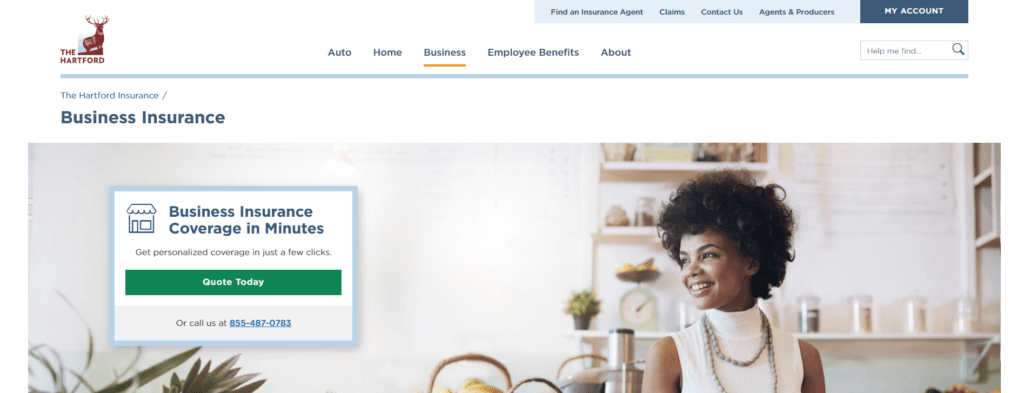
Hartford specializes in providing insurance solutions for small businesses. They offer a Business Owner’s Policy (BOP) that combines property insurance, liability insurance, and business interruption coverage. Hartford is recognized for its expertise in serving various industries and its commitment to risk management.
3. Chubb
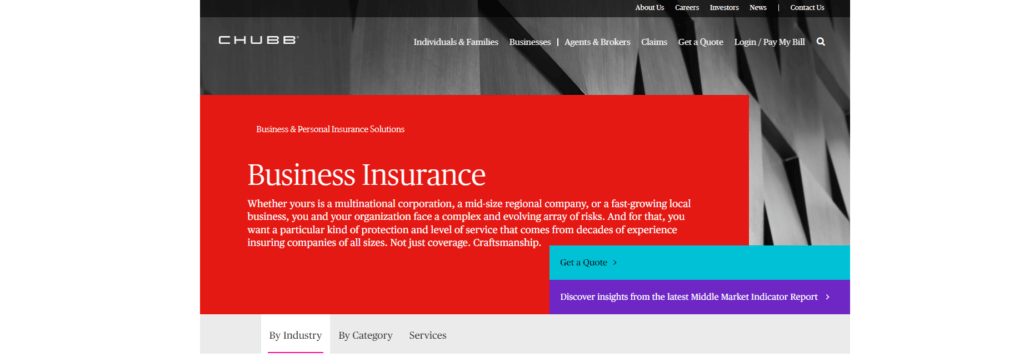
Chubb is a global insurance company that offers comprehensive coverage options for businesses of all sizes. They provide property insurance, liability insurance, workers’ compensation, cyber insurance, and more. Chubb is known for its financial strength and tailored insurance solutions.
4. Travelers

Travelers are one of the largest providers of commercial insurance in the United States. They offer a wide range of coverage options, including property insurance, general liability insurance, professional liability insurance and business interruption insurance. Travelers are known for their extensive network of agents and risk management services.
5. CNA

CNA is a leading commercial insurance provider that offers coverage for businesses across various industries. They provide property insurance, liability insurance, workers’ compensation, and specialty coverage such as cyber liability and directors and officers insurance. CNA is recognized for its expertise in risk management and industry-specific solutions.

Liberty Mutual offers a broad range of insurance products for businesses, including property insurance, general liability insurance, commercial auto insurance, and workers’ compensation. They provide customizable policies and dedicated claims support.
7. Nationwide
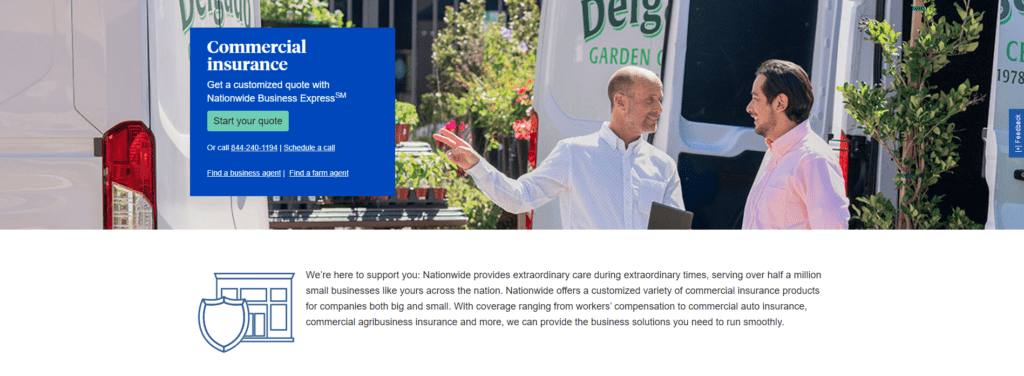
Nationwide is a well-established insurance company that offers business insurance coverage for small and midsize businesses. They provide property insurance, general liability insurance, commercial auto insurance, and specialty coverages such as professional liability and cyber insurance.
8. Allstate
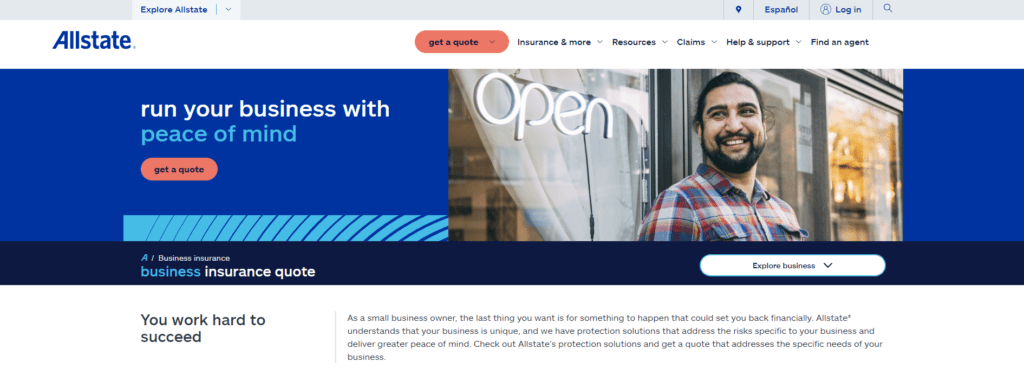
Allstate is known for its lines of insurance but also offers business insurance solutions. They provide property insurance, general liability insurance, commercial auto insurance, and worker’s compensation coverage. Allstate offers a range of customizable options for businesses.
9. Hiscox
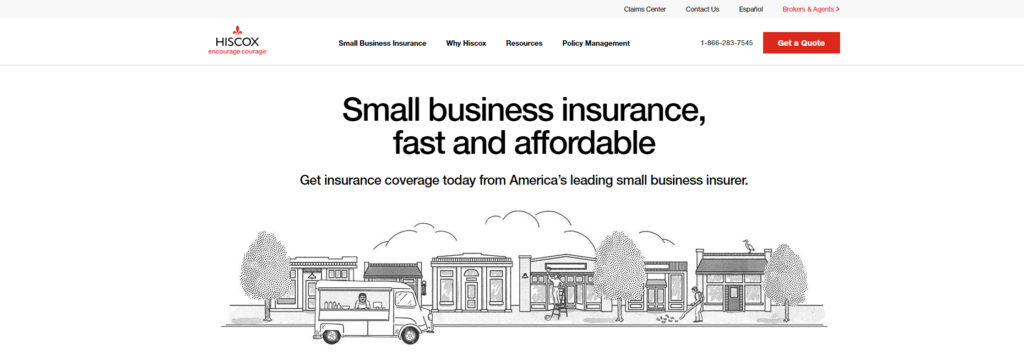
Hiscox specializes in providing insurance solutions for small businesses and professionals. They offer professional liability insurance, general liability insurance, and business owners’ insurance tailored to specific industries such as technology, consulting, and healthcare.

Farmers Insurance offers business insurance coverage for a wide range of industries and business sizes. They provide property insurance, general liability insurance, commercial auto insurance, and workers’ compensation coverage. Farmers Insurance is known for its strong customer support and competitive pricing.
These are just a few of the top business insurance providers in the United States. When selecting an insurance company, it’s essential to consider your specific business needs, coverage requirements, and budget. Consulting with an experienced insurance agent can help you navigate the options and find the best fit for your business.
Conclusion
Business insurance is an essential investment for any business, regardless of its size or industry. It provides financial protection, minimizes risks, and safeguards your assets, employees, and customers. By understanding the various types of coverage available, considering key factors, and choosing the right insurance policy, you can protect your venture and secure peace of mind. Don’t leave the fate of your business to chance; invest in comprehensive business insurance today.
Frequently Asked Questions
1. Is business insurance mandatory for all businesses?
The insurance requirements vary by jurisdiction and business type. While certain coverage like workers’ compensation is often mandatory, other types of insurance may be recommended or optional. Consult with an insurance professional to understand the specific requirements of your business.
2. Can I customize my business insurance policy to suit my unique needs?
Yes, insurance providers offer customizable policies to cater to the specific risks and needs of businesses. Working with an experienced insurance agent or broker can help you tailor a policy that aligns with your requirements.
3. How can I reduce the cost of business insurance?
There are several strategies to manage insurance costs, such as increasing deductibles, implementing risk management practices, bundling coverage, and reviewing your coverage needs periodically. Discuss cost-saving options with your insurance provider.
4. What happens if I don’t have business insurance?
Without adequate insurance coverage, you may be personally liable for any financial losses, legal expenses, or damages incurred by your business. It could potentially lead to bankruptcy or significant financial strain.
5. Can I update my insurance coverage as my business grows?
Yes, it’s important to regularly review and update your insurance coverage as your business evolves. Communicate any changes or expansions to your insurance provider to ensure you have the appropriate level of coverage to protect your growing business adequately.



